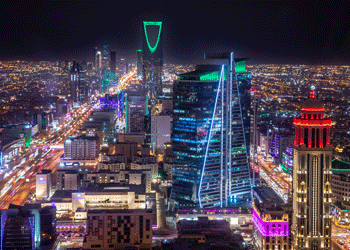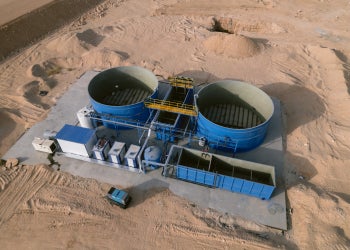Qatar’s return to economic normality
8 January 2024

Diplomacy, not economics, was the flavour of the fourth quarter for Qatar, which has become active again in the conflict resolution arena in recent months, mediating in disputes as far apart as Gaza and Venezuela.
Qatar’s efforts in November to secure a truce in the war between Israel and Hamas secured particularly favourable headlines for Prime Minister and Foreign Affairs Minister Sheikh Mohammed bin Abdulrahman bin Jassim al-Thani and Minister of State Mohammed bin Abdulaziz al-Khulaifi.
Regretfully, the humanitarian truce proved short-lived, and further efforts by Qatar, Egypt and others to forge a broader ceasefire have yet to succeed – though Doha has had successes elsewhere with its mediation efforts in recent months.
Equally important in terms of cementing Doha’s ties with Washington was Qatar’s role in securing the release of US prisoners in Venezuela on 20 December. Qatar’s involvement led to 10 American inmates being allowed to go home, in return for one Venezuelan. Al-Khulaifi said of the Venezuelan deal that it was part of a broader mediation effort to reduce tensions between the two countries.
It was certainly appreciated by Washington, with US ambassador to Doha, Timmy Davis, saying in response: “Once again, Qatar has proven itself an indispensable ally to the United States.”
The positive US sentiment towards Qatar has also been reflected in the new year by a deal between the two countries for the renewal of the US military presence at the expansive Al-Udeid Air Base for another 10 years.
More broadly, Qatar’s recently renewed wave of diplomacy efforts harks back to previous initiatives by Qatar to promote itself as a leading global mediator. From 2008-16, it worked on reducing tensions and forging peace agreements in about 10 regional and international conflicts.
These diplomatic efforts took something of a back seat as the country built itself up for the 2022 football World Cup, but it now appears that the government’s appetite for a role as an instrument of soft power has returned.
Economic heading
At the same time, it remains a pressing concern for Doha to develop a replacement anchoring economic initiative to follow in the wake of its World Cup boom. Such direction is currently lacking, and that was palpably evident when details of the state’s budget for 2024 were issued on 21 December.
Outside of the energy sector, there are only a handful of strategic projects that are continuing, such as a national cancer hospital – and nothing on the scale of the stadium and infrastructure build-out for the football tournament, which sustained the country’s non-hydrocarbons economic growth for a decade.
There are only a handful of strategic projects that are continuing – and nothing on the scale of the stadium and infrastructure build-out for the football tournament
Several more large events are scheduled to take place in the coming years, including the 2030 Asian Games, but none are likely to rival the World Cup in terms of spending or impact.
Overall, expenditure is set to reach QR200.9bn ($55.2bn) in 2024, just 1 per cent higher than the year before. Public sector salaries and wages will account for QR64bn of that total, up 2.4 per cent year-on-year. However, major capital expenditure is down 8.3 per cent.
Based on the highly conservative estimate of an average oil price of $60 a barrel in 2024, compared to $65 a barrel in 2023, Qatar’s revenues are set to decrease by 14.5 per cent to QR159bn this year. This reduction will be partly offset by an expected 2.4 per cent rise in non-oil revenues to QR43bn.
In a press conference on 21 December, Finance Minister Ali bin Ahmed al-Kuwari said that if spending remains at the projected level, the budget will produce a surplus of QR1.1bn, compared to the 2023 budget surplus estimate of QR29bn. However, Qatar also plans to pay off QR7.3bn of debt during the year, meaning the exchequer is projected to realise a deficit of QR6.2bn.
James Swanston, Middle East and North Africa economist at London-based Capital Economics, said the spending plans could yet be expanded. “Qatar’s 2024 state budget showed a slight fiscal loosening … and, if anything, officials may raise spending even further,” he said.
There is plenty of room for manoeuvre given the country’s ample gas reserves and low debts. Qatar’s public debt shrank from 58.4 per cent of GDP in 2021 to 42.5 per cent in 2022 and is expected to continue to fall to 37.4 per cent by the end of this year.
The Washington-based IMF describes the trajectory of the post-World Cup economy as one of “normalisation”. In a statement issued on 21 November following a visit to Doha, IMF mission chief Ran Bi said: “After very strong performance in 2022, economic growth has been normalising, while the medium-term outlook remains favourable.”
The IMF expects annual output to expand by about 1.75 per cent in the period 2023-25, with the non-hydrocarbons sector growing at 2.75 per cent a year. The IMF’s forecast in October was based on a more optimistic oil price of $79.9 a barrel, however.
Energy expansion
In the absence of another national project of note, Qatar has been doubling down on its investments in the expansion and development of its upstream gas infrastructure.
In May, QatarEnergy awarded the $10bn contract for the development of two new liquefied natural gas (LNG) trains at North Field South to the joint venture of France’s Technip Energies and Greece’s Consolidated Contractors Company. This built on a similarly significant $13bn contract awarded in 2021 to Japan’s Chiyoda and Technip Energies to build four LNG trains as part of the North Field expansion project.
Doha also struck a series of long-term supply deals in 2023 for the output from the expanded North Field, including three 27-year contracts signed in October alone, covering the supply of 3.5 million tonnes a year (t/y) of LNG to both TotalEnergies and Shell, and 1 million t/y to Italian major Eni. The following month, Doha signed a deal to supply a further 3 million t/y over 27 years to China Petrochemical Corporation (Sinopec).
QatarEnergy chief executive and Minister of State for Energy Affairs, Saad al-Kaabi, said in mid-December that more deals were imminent. Meanwhile, on 28 December, QatarEnergy announced a five-year crude oil supply deal with a Singapore-based subsidiary of Shell, covering up to 18 million barrels a year from January 2024. Al-Kaabi said it was his company’s first-ever five-year crude sales agreement.
There remains a ready market for the country’s natural gas, not least as the world’s energy transition fuel of choice, as a halfway step away from more polluting oil and coal. Doha nevertheless knows that it needs to find more non-hydrocarbons revenue sources. In the IMF’s November statement, Bi said the country’s plans include “accelerating revenue diversification through further mobilisation of non-hydrocarbons tax revenues”, but exactly what this means in practice has yet to be spelt out.
 MEED's February 2024 special report on Qatar includes:
MEED's February 2024 special report on Qatar includes:
> GOVERNMENT & ECONOMY: Qatar’s return to economic normality
> BANKING: Qatar’s banks adjust to new circumstances
> OIL & GAS: Qatar enters period of oil and gas consolidation
> POWER & WATER: Qatar power and water projects to take off
> CONSTRUCTION: Qatar construction enters reboot mode
Exclusive from Meed
-
 Solar deals signal Saudi Arabia’s energy ambitions
Solar deals signal Saudi Arabia’s energy ambitions13 February 2026
-
 Saudi Arabia appoints new investment minister
Saudi Arabia appoints new investment minister13 February 2026
-
 Indian firm wins major Oman substation contract
Indian firm wins major Oman substation contract12 February 2026
-
 Developers appoint contractor for $500m wastewater treatment project
Developers appoint contractor for $500m wastewater treatment project12 February 2026
-
 Dewa raises Empower stake in $1.41bn deal
Dewa raises Empower stake in $1.41bn deal12 February 2026
All of this is only 1% of what MEED.com has to offer
Subscribe now and unlock all the 153,671 articles on MEED.com
- All the latest news, data, and market intelligence across MENA at your fingerprints
- First-hand updates and inside information on projects, clients and competitors that matter to you
- 20 years' archive of information, data, and news for you to access at your convenience
- Strategize to succeed and minimise risks with timely analysis of current and future market trends

Related Articles
-
 Solar deals signal Saudi Arabia’s energy ambitions
Solar deals signal Saudi Arabia’s energy ambitions13 February 2026
 Commentary
Commentary
Mark Dowdall
Power & water editorSaudi Arabia’s recent agreement to build $2bn-worth of solar power plants in Turkiye is the latest sign that the kingdom’s energy influence is changing.
Historically, this was measured in oil barrels and export volumes. Increasingly, this is extending to capital, structuring expertise and the ability to deliver record-low tariffs in competitive markets.
Announcing the deal, Turkish Energy Minister Alparslan Bayraktar said tariffs for the plants would be the country’s lowest on record, with electricity purchased under 25-year power purchase agreements.
It followed another announcement, in January, that Acwa is investing $200m to build a large-scale solar photovoltaic (PV) plant in the Philippines.
Whether Saudi-backed companies ultimately retain long-term stakes or primarily develop and build the assets, their role at the front end is significant.
Sponsors that bring sovereign backing, clear procurement processes and access to low-cost financing can influence tariffs and contract terms from the outset.
There is also a geopolitical layer. Investing in Turkiye, or anywhere for that matter, strengthens political and economic ties at a time when regional alignments are shifting.
Energy infrastructure is also long-term by its nature. It connects ministries, regulators, lenders and operators in relationships that often extend well beyond a single transaction.
Saudi Arabia has spent the past few years refining its approach to pricing, structuring and financing large-scale renewables at home.
Exporting that expertise may not rival oil in scale or visibility, but it does signal that Saudi Arabia is becoming more than just an energy supplier.
Increasingly, it is becoming a participant in how other countries design and finance their energy transitions. That influence is still significant.
https://image.digitalinsightresearch.in/uploads/NewsArticle/15645903/main.jpg -
 Saudi Arabia appoints new investment minister
Saudi Arabia appoints new investment minister13 February 2026
Register for MEED’s 14-day trial access
King Salman Bin Abdulaziz Al-Saud has made a series of senior government changes, including Khalid Al-Falih leaving his role as investment minister to become minister of state and a member of the cabinet.
Al-Falih has been replaced by Fahad Al-Saif as investment minister. Al-Saif has been head of the Investment Strategy and Economic Insights Division at the Public Investment Fund (PIF) since 2024. That role involved formulating PIF’s long-term investment strategy. He has also served as head of the Global Capital Finance Division, a role he has held since joining PIF in 2021.
The change of investment minister comes at a time when securing investments has become a key priority for Saudi Arabia as it prepares to hand over more projects to the private sector for delivery.
King Salman also named Abdullah Al-Maghlouth as vice-minister of media and Abdulmohsen Al-Mazyad as vice-minister of tourism. Khalid Al-Yousef was named attorney general, and Sheikh Ali Al-Ahaideb will serve as president of the Board of Grievances.
Faihan Al-Sahli was selected as director general of the General Directorate of Investigation, while Abdulaziz Al-Arifi was chosen to lead the National Development Fund. Haytham Al-Ohali will head the Communications, Space and Technology Commission, and Fawaz Al-Sahli will chair the Transport General Authority.
https://image.digitalinsightresearch.in/uploads/NewsArticle/15645415/main.gif -
 Indian firm wins major Oman substation contract
Indian firm wins major Oman substation contract12 February 2026

India’s Larsen & Toubro has won a contract to build the Majan 400/220/132kV grid station in Oman.
Estimated to cost $100m, the project includes an associated 400kV line-in line-out underground cable from Sohar Free Zone to the Sohar Interconnector Station.
The contract was awarded by Oman Electricity Transmission Company (OETC), part of the government-owned Nama Group.
The grid station will comprise eight 400kV gas-insulated switchgear (GIS) bays, eight 220kV GIS bays and 10 132kV GIS bays at the new Sohar Free Zone substation.
The scope includes the installation of two 500MVA, 400/220kV transformers and two 500MVA, 220/132kV transformers.
Local firm Monenco Consulting Engineers was appointed in April last year to provide design and supervision services for the project.
As MEED exclusively revealed, the main contract was tendered in June, as part of three significant contracts to build new substations in the sultanate.
The second contract, worth about $35m, covers the construction of the Sultan Haitham City 132/33kV grid station and associated 132kV line-in line-out underground cables running 4 kilometres from Mabella to Mabella Industrial Zone.
The third contract, valued at about $100m, covers the construction of the Surab 400/33kV grid station and an associated 400kV line-in line-out cable from the Duqm grid station to the Mahout grid station.
Local firms Muscat Engineering Consulting and Hamed Engineering Services are consultants for the Sultan Haitham City and Surab projects, respectively.
The two remaining contracts are currently under bid evaluation, with awards expected this quarter.
https://image.digitalinsightresearch.in/uploads/NewsArticle/15638107/main.jpg -
 Developers appoint contractor for $500m wastewater treatment project
Developers appoint contractor for $500m wastewater treatment project12 February 2026

Register for MEED’s 14-day trial access
Egypt’s Orascom Construction has won the engineering, procurement and construction (EPC) contract for a major wastewater treatment project in Saudi Arabia’s Eastern Province.
A consortium of Saudi utilities provider Marafiq, the regional business of France’s Veolia and Bahrain/Saudi Arabia-based Lamar Holding is developing the $500m (SR1.875bn) industrial wastewater treatment plant (IWWTP) in Jubail Industrial City 2.
Sources close to the project confirmed the appointment to MEED, adding that the project has now entered the construction phase.
Industry sources also said that financial close on the project is expected to be reached in the coming days.
In September, the developer consortium was awarded a contract, under a 30-year concession agreement, by Saudi Aramco Total Refining & Petrochemical Company (Satorp), a joint venture of Saudi Aramco and France’s TotalEnergies.
The planned facility will treat and recycle wastewater from Satorp’s under-construction Amiral chemical derivatives complex, also in Jubail.
Marafiq, formally Power & Water Utility Company for Jubail and Yanbu, will own a 40% stake in the dedicated project company. Veolia Middle East SAS will hold a 35% stake, and Lamar Holding’s Lamar Arabia for Energy will hold the other 25%.
The planned IWWTP, which will primarily serve the $11bn sprawling Amiral chemicals zone, will implement advanced water treatment and recovery technologies to process complex industrial effluents, including spent caustic streams. Treated water will be reintegrated into the industrial processes, supporting closed-loop reuse and energy efficiency.
The project follows a concession-style model, akin to a public-private partnership (PPP), where the developer consortium invests in, builds and operates the wastewater plant over a 30-year period, with returns linked to service delivery.
Marafiq has been involved in several similar projects across Saudi Arabia, including as the sole owner of the Jubail industrial water treatment plant (IWTP8), which treats complex industrial effluents for petrochemical and heavy industrial companies.
In 2020, Saudi Services for Electro Mechanic Works was awarded the $202m main contract for the fourth expansion phase of IWTP8. Construction works on the project are expected to be completed by the end of the quarter.
 READ THE FEBRUARY 2026 MEED BUSINESS REVIEW – click here to view PDF
READ THE FEBRUARY 2026 MEED BUSINESS REVIEW – click here to view PDFSpending on oil and gas production surges; Doha’s efforts support extraordinary growth in 2026; Water sector regains momentum in 2025.
Distributed to senior decision-makers in the region and around the world, the February 2026 edition of MEED Business Review includes:
> AGENDA: Mena upstream spending set to soar> INDUSTRY REPORT: MEED's GCC water developer ranking> INDUSTRY REPORT: Pipeline boom lifts Mena water awards> MARKET FOCUS: Qatar’s strategy falls into place> CURRENT AFFAIRS: Iran protests elevate regional uncertainty> CONTRACT AWARDS: Contract awards decline in 2025> LEADERSHIP: Tomorrow’s communities must heal us, not just house us> INTERVIEW: AtkinsRealis on building faster> LEADERSHIP: Energy security starts with rethinking wasteTo see previous issues of MEED Business Review, please click herehttps://image.digitalinsightresearch.in/uploads/NewsArticle/15637523/main.jpg -
 Dewa raises Empower stake in $1.41bn deal
Dewa raises Empower stake in $1.41bn deal12 February 2026
Dubai Electricity & Water Authority (Dewa) has announced it has increased its stake in Emirates Central Cooling Systems Corporation (Empower) from 56% to 80%.
The transaction was completed through the purchase of 2.4 billion shares and the transfer of the entire ownership of Emirates Power Investment (EPI), which is wholly owned by Dubai Holding.
The total value of the deal is AED5.184bn ($1.41bn).
Empower currently holds over 80% of Dubai’s district cooling market and operates 88 district cooling plants across the emirate.
According to MEED Projects, the UAE’s district cooling sector currently has nine projects worth $1.29bn in the pre-execution phase.
Empower has ownership in four of these projects, which have a combined value of $472m.
This includes a $200 million district cooling plant at Dubai Science Park, with a total capacity of 47,000 refrigeration tonnes serving 80 buildings.
Empower signed a contract to design the plant last August, with construction scheduled to begin by the end of the first quarter of 2026.
The utility is also building a district cooling plant at Dubai Internet City.
UAE-based TMF Euro Foundations was recently appointed as the enabling and piling subcontractor for the project.
https://image.digitalinsightresearch.in/uploads/NewsArticle/15635949/main.jpg


